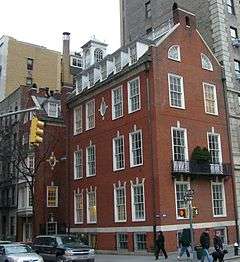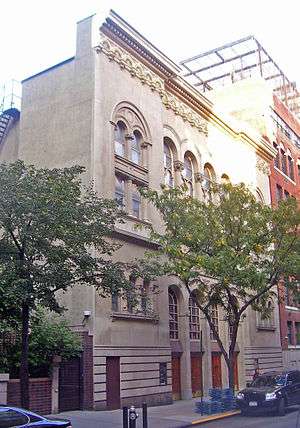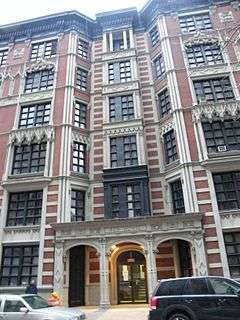85th Street (Manhattan)
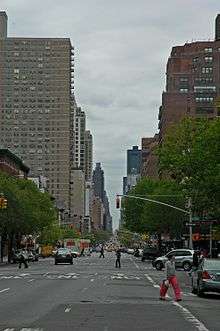 Looking south on Second Avenue from 85th Street (2005) | |
| Location | Manhattan |
|---|---|
| Postal code | 10028 (east), 10024 (west)[1] |
| West end | Riverside Drive |
| East end | East End Avenue |
| North | 86th Street |
| South | 84th Street |
85th Street is a westbound-running street, running from East End Avenue to Riverside Drive in the borough of Manhattan in New York City.
The street provides access to the 85th/86th Street Transverse, which runs east-west through Central Park, heading from the Upper East Side (where it is known as East 85th Street) to the Upper West Side (where it is known as West 85th Street).[2] It includes landmarks such as the Lewis Gouverneur and Nathalie Bailey Morris House at 100 East 85th Street, the sidewalk clock at East 85th Street and Third Avenue, the Yorkville Bank Building at 201–203 East 85th Street, Red House at 350 West 85th Street, and Regis High School.
History
In 1837, the Board of Aldermen of New York City initially voted not to approve, but subsequently approved, the opening of East 85th Street between Third Avenue and Fifth Avenue, which the Committee on Roads and Canals had offered up as a resolution on the petition of owners of property on the street.[3] In 1839, the Board of Aldermen approved the opening of West 85th Street between Fifth Avenue and Ninth Avenue.[4]
By the 1840s, a short length designated as West 85th Street had been created as a narrow lane east of Eighth Avenue.[5] Most of West 85th Street was laid out following the American Civil War.[6] However, until the 1880s the rate of development on the street was slow.[6] At that time, following an improvement in public transportation, people began to speculate on the property on the street.[6]
In 1971, John Corry of the Times wrote a series of stories about life on West 85th Street between Central Park and Columbus Avenue.[5]
Transportation
No New York City Subway stations are located on the street itself. Several are on nearby 86th Street, however:[7]
- 86th Street station at Second Avenue is under construction, and will serve the Q train.
- 86th Street station at Lexington Avenue, serving the 4 5 6 <6> trains.
- 86th Street station at Broadway, serving the 1 2 trains.
- 86th Street station at Central Park West, serving the A B C trains.
Notable places and residents
There are several significant landmarks on 85th Street.
East Side
The building at 100 East 85th Street, originally known as Lewis Gouverneur and Nathalie Bailey Morris House, is a large brick red townhouse that was built in 1913–14 in a neo-Federal style. Its architect was Ernest Flagg.[8] It was designated a landmark by the New York City Landmarks Preservation Commission in 1973, and added to the National Register of Historic Places in 1977.[9][10]
Congregation Kehilath Jeshurun (originally "Anshe Jeshurun"), a Modern Orthodox synagogue founded by Russian Jewish immigrants in 1872, is located at 125 East 85th Street, between Park Avenue and Lexington Avenue, in a building built in 1902.[11] The lower division of the Ramaz School, a coeducational, private Modern Orthodox Jewish prep school, shares a building with the congregation.[12]
The German American Bund, an American Nazi organization, had its national headquarters at 178 East 85th Street from 1936 through the early 1940s, and occasionally paraded in the neighborhood in Nazi uniforms.[13][14][15]
The high-rise apartment building shown in the opening credits of The Jeffersons is located at 185 East 85th Street and Third Avenue.[16][17][18]
The sidewalk clock at East 85th Street and Third Avenue, dating from the late 1800s and likely produced by E. Howard & Co., was designated a landmark in 1981.[19] Constructed to resemble a pocket watch, it is 15 feet (4.6 m) high including its base.[19]
At 201–203 East 85th Street, the Yorkville Bank Building (1905), a four-story building designed by Robert Maynicke, was designated a landmark in 2012.[20]
Instrument maker Vincent Bach manufactured trumpets and trumpet mouthpieces at 204 East 85th Street in the early 20th Century.[21][22][23]
The building at 209 East 85th Street was constructed in 1919 aS the union hall of the Musical Mutual Protective Union.[24]
Minnie Marx and Sam Marx, the parents and manager of the Marx Brothers, lived at 330 East 85th Street.[25]
The clapboard shingle house at 412 East 85th Street was built around 1855. It was restored in 1988 by architect Alfredo De Vido.[8]
Author Henry Miller, who wrote Tropic of Cancer, was born in 1891 on the top floor of and lived at 450 East 85th Street.[26][27]
Author Louise Fitzhugh lived at 524 East 85th Street, between East End and York Avenues, and her heroine "Harriet" in Harriet the Spy lived in the area.[28]
The glassy Modernist building at 525 East 85th Street was built in 1958.[8][29] Its architect was Paul Mitarachi.[8]
Central Park
The 85th Street Transverse cuts through Central Park, and is directly below the Jacqueline Kennedy Onassis Reservoir.[30] In the early 1880s, most of the cross-town traffic in the area traveled on it.[31] In 1917, New York Railways ran across the traverse road 0.652 miles (1.049 km) on 85th Street, from Eighth Avenue through Central Park to Madison Avenue.[32]
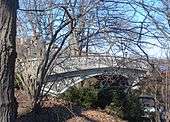
Southwest Reservoir Bridge, at 85th Street in Central Park, was designed by Calvert Vaux and is decorated with elegant iron floral scroll ornamentation along its 38 feet (12 m) of railings and spandrels.[33][34][35]
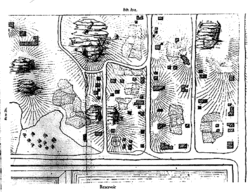
The site of Seneca Village is in Central Park near West 85th Street. The three lots on which the village was established were purchased in 1825 by Andrew Williams for $125 ($2,600 in current dollar terms), and sold by him to the City of New York three decades later for $2,335 ($59,400 in current dollar terms). In the mid-19th century it was a shanty-town, and it may have been populated by free blacks in the early 1800s.[31][36] The African Methodist Episcopal Zion Church was at this location.[36]
The Spector Playground is located in Central Park near West 85th Street.[37]
Mariners' Gate is at Central Park and West 85th Street, at an entrance to the park.[38] The name for the gate was chosen as reflecting one of the types of people it was expected would be enjoying the park, at the time the park was built.[39]
West Side
Rossleigh Court at 1 West 85th Street, constructed between 1906 and 1907, was designed by Mulliken and Moeller and built by Gotham Building and Construction.[40] It followed the popular "French Flat" model in a Beaux-Arts style. Novelist Ellen Glasgow lived in the building for a few months every year in the early 20th century.[41]
44 West 85th Street was the location of the Nippon Club of New York City, a private social club founded in 1905 by Jokichi Takamine for Japanese Americans and Japanese nationals, in the early 20th century.[42]
At 140 West 85th Street, a Dawn Redwood (metasequoia glyptostroboides) endangered coniferous tree can be seen.[43]
Mannes College of Music is a music school located at 150 West 85th Street, which moved there in 1984 seeking larger quarters.[44][45]
329, 331, 333, 335, and 337 West 85th Street were built in 1890–91.[46] They are brownstone and brick Queen Anne-Romanesque Revival architecture.[46][47] Journalist Heywood Broun and feminist Ruth Hale lived at 333 West 85th Street.[48]
On the corner of West 85th Street and West End Avenue, a Japanese Maple (acer palmatum) species of woody plant can be seen.[43]
Red House at 350 West 85th Street, between West End Avenue and Riverside Drive, was built in 1903–04, and the six-story French Renaissance/Gothic building was designated a landmark in 1982.[6][49] It was one of the first apartment buildings in the area, supplanting the earlier row houses.[46] Writer Dorothy Parker lived here at one time.[48]
See also
-
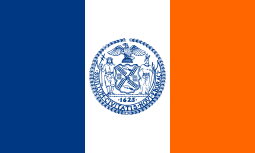 New York City portal
New York City portal
References
- ↑ "Zip Code Map" (PDF). www.unhp.org. Retrieved June 9, 2014.
- ↑ 85th Street, Manhattan, on Google Maps
- ↑ Proceedings of the Board of Aldermen – New York (N.Y.). Board of Aldermen. 12. The Board. 1837. p. .
- ↑ Documents of the Board of Aldermen of the City of New York. 5. The Board. 1839. p. .
- 1 2 Peter Salwen (1989). Upper West Side Story: A History and Guide. p. .
- 1 2 3 4 Barbaralee Diamonstein-Spielvogel (2011). The Landmarks of New York, Fifth Edition: An Illustrated Record of the City's Historic Buildings. SUNY Press. p. .
- ↑ http://web.mta.info/nyct/maps/subwaymap.pdf
- 1 2 3 4 Norval White; Elliot Willensky; Fran Leadon (2010). AIA Guide to New York City. Oxford University Press. p. .
- ↑ "New World Foundation Building (formerly Louis G. Morris House)" (PDF). Landmarks Preservation Commission. April 19, 1973. Retrieved June 7, 2014.
- ↑ National Park Service (2009-03-13). "National Register Information System". National Register of Historic Places. National Park Service.
- ↑ Jeffrey S. Gurock; Jacob J. Schacter (2013). A Modern Heretic and a Traditional Community: Mordecai M. Kaplan, Orthodoxy, and American Judaism. Columbia University Press. p. 40.
- ↑ "The Ramaz School: About Ramaz". Ramaz.org. Retrieved June 6, 2014.
- ↑ H. Paul Jeffers (2002). The Napoleon of New York: Mayor Fiorello La Guardia. John Wiley & Sons. p. .
- ↑ Lyn Wilkerson (2010). Historical Cities: New York City. p. .
- ↑ Special Agent (November 17, 1941). "German American Bund". Federal Bureau of Investigation. Retrieved June 10, 2014.
- ↑ Fodor's New York City 2009; Page 143, Fodor's Travel Publications (2008)
- ↑ Don Voorhees (2011). The Indispensable Book of Useless Information: Just When You Thought It Couldn't Get Any More Useless—It Does. Penguin. p. .
- ↑ Kieran Crowley (2007). The Surgeon's Wife. Macmillan. p. .
- 1 2 Christopher Gray (November 13, 1988). "STREETSCAPES; Time Alone Will Tell Ownership". The New York Times. Yorkville (Nyc). Retrieved June 9, 2014.
- ↑ Landmarks Preservation Commission (June 12, 2012). "Yorkville Bank final report" (PDF). Retrieved June 7, 2014.
- ↑ William H. Rehrig; Robert Hoe (1991). The heritage encyclopedia of band music: composers and their music. Integrity Press. p. .
- ↑ Metronome. 1928. p. .
- ↑ "Bach Manufacturing Locations". BachLoyalist.com. December 23, 2006. Retrieved June 8, 2014.
- ↑ Christopher Gray (June 6, 1999). "Streetscapes /Readers' Questions; Echoes of a Union Hall; Artificial Sunlight". New York City: New York Times. Retrieved June 8, 2014.
- ↑ "Parents". The Marx Brothers. Retrieved June 9, 2014.
- ↑ Patrick Bunyan (2010). All Around the Town: Amazing Manhattan Facts and Curiosities. Fordham Univ Press. p. .
- ↑ Nexus: The International Henry Miller Journal. Roger Jackson Pub. 2004. p. .
- ↑ Brown, Jennifer M. (May 21, 2003). "The Booklover's Big Apple: PW Daily Talks with Leonard Marcus". Publishers Weekly. Retrieved June 7, 2014.
- ↑ John Hill (2011). Guide to Contemporary New York City Architecture. W. W. Norton & Company. p. .
- ↑ Eve Zibart (2010). The Unofficial Guide to New York City. John Wiley & Sons. p. .
- 1 2 Roy Rosenzweig; Elizabeth Blackmar (1992). The Park and the People: A History of Central Park. Cornell University Press. p. .
- ↑ New York (State). Legislature. Senate (1917). Street-railway track mileage; Documents of the Senate of the State of New York. J.B. Lyon Company. p. .
- ↑ "Bridges of Central Park". Centralpark.com. Retrieved June 8, 2014.
- ↑ Raymond Carroll (2008). The Complete Illustrated Map and Guidebook to Central Park. Sterling Publishing Company. p. .
- ↑ David W. Dunlap (July 5, 1991). "Small Scale, Great Beauty: The Bridges of Central Park". New York Times. New York City; Central Park. Retrieved June 8, 2014.
- 1 2 Peter Salwen (1989). Upper West Side Story: A History and Guide. p. .
- ↑ "New York Kids' Playgrounds – New York Family Guide". New York Magazine. Fall 2004. Retrieved June 9, 2014.
- ↑ Edward F. Bergman (2001). The Spiritual Traveler: New York City: the Guide to Sacred Spaces and Peaceful Places. p. .
- ↑ Erin McHugh (2005). Where?. Sterling Publishing Company, Inc. p. .
- ↑ New York City Landmarks Preservation Commission. Upper West Side/ Central Park West District Designation Report, Vol. I: Essay/ Architects' Appendix, April 24, 1990.
- ↑ Pamela R. Matthews (1994). Ellen Glasgow and a Woman's Traditions. University of Virginia Press. p. .
- ↑ Japan in New York. Anraku Publishing Company. 1908. p. .
- 1 2 Leslie Day (2013). Field Guide to the Street Trees of New York City. JHU Press. p. .
- ↑ Brad Hill; Richard Carlin; Nadine Hubbs (2005). Classical. p. .
- ↑ Time Out New York. Time Out Guides. 2010. p. .
- 1 2 3 Andrew Dolkart (2008). Guide to New York City Landmarks. John Wiley & Sons. p. .
- ↑ Norval White; Elliot Willensky; Fran Leadon (2010). AIA Guide to New York City. Oxford University Press. p. .
- 1 2 Kevin C. Fitzpatrick (2013). A Journey Into Dorothy Parker's New York. p. .
- ↑ "Red House, 350 West 85th Street, Borough of Manhattan" (PDF). Landmarks Preservation Commission. September 14, 1982. Retrieved June 7, 2014.
Coordinates: 40°46′50″N 73°57′37″W / 40.7806°N 73.9604°W
